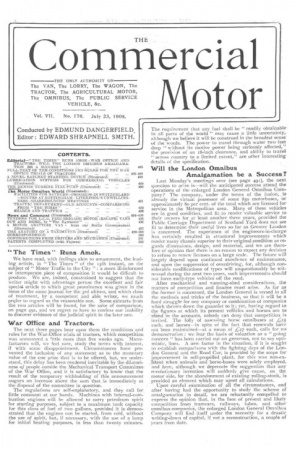"The Times" Runs Amok.
Page 1

If you've noticed an error in this article please click here to report it so we can fix it.
We have read, with feelings akin to amazement, the leading article, in " The Times " of the i5th instant, on the subject of " Motor Traffic in the City " : a More ill-informed or intemperate piece of composition it would be difficult to produce. We are, indeed, constrained to suggest that the writer might with advantage peruse the excellent and fair special. article to which great prominence was given in the issue of the same journal for the 3rd ultimo, and which class of treatment, by a competent and able writer, we much prqfer to regard as the reasonable one. Some extracts from the two articles will be found, for the sake of comparison, on page 492, and we regret to have to confess our inability to discover evidence of the judicial spirit in the later one.
War Office and Tractors.
The next three pages bear upon them the conditions and rules for the War-Office trials of tractors, which competition was announced a 1ittle more than five weeks ago. Manufacturers will, we feel sure, study the terins with interest, if with some disappointment. Circumstances have prevented the inclusion of any statement as to the monetary value of the one prize that is to 'be offered, but we understand, this delay has been rendered inevitable by the dilatoriness of people outside the Mechanical Transport committee of the War Office, and it is satisfactory to, know that the result of the temporary withholding of this announcement augurs an increase above the sum that .is immediately at the disposal of the committee in question.
The regulations are self-explanatory, and they call for little comment at our hands. Machines with internal-combustion engines will be allowed to carry petroleum spirit for starting purposes, subject to a maximum tank capacity for this class of fuel of two gallons, provided it is demonstrated that the engines can be started, from cold, without the use o;f spirit, but, if necessary, with the use of a lamp for initial heating purposes, in less than twenty minutes. The requirement that any fuel shall be " readily obtainable in all parts of the world " may cause a little uncertainty,: although we believe it will be construed in the broadest sense of the wor_ds. The power to travel through water two feet deep "without its motive power being seriously affected," the provision of an IS-inch clearance, and ability to traVel " across country to a limited extent," are other interesting detailsof the specification.
Will the London Omnibus Amalgamation be a Success?
Last Monday's meetings over (see page 491), the next question to arise is—will the anticipated success' attend the operations of the enlarged London General Omnibus Com. par.-or?. The company, under the terms of the fusion, is already the virtual possessor of some 850 motorbuses, -"or approximately So per cent. of the total which are licensed for service in the Metropolitan area. Many of these vehicles are in good condition, and fit-to render valuable service to their owners for at least another three years, provided the Public Carriage Department of Scotland Yard doesnot see fit to determine their useful lives so far as Greater Londonis concerned. The experience of the engineers-in-charge has certainly resulted in structural improvements which render many chassis superior to their original condition as regards dimensions, design, and material, and we are therefore of opinion that there is no reason to expect any decision to refuse to renew licenses on a large scale. The future will largely depend upon continued excellence of maintenance, and upon the suppression of overdriving, for, although considerable modifications of types will unquestionably be witnessed during the next two years, such improvements should not force early-type vehicles off the road. After mechanical and running-shed considerations, the matters of competition and finance must arise. As far as the former is concerned, the London General is versed in all the methods and tricks of the business, so that it will be a hard struggle for any company or combination of companies whic.hthrows down the gauntlet to it; yet, haying regard to the figures at which its present veRicles and horses are to stand in the accounts, nobody can deny that competition is invited. The folly of assessing horse omnibuses at ;55 each, and horses—in spite of the fact that renewals have not been maintained—at a -mean of .,";'27 each, calls for no demonstration : we fear the basis of valuation as a "going concern '-' has been carried out on generous, not to say optimistic, lines. A new factor in the situation, if it is sought to establish comparisons with the fighting days of the London General and the Road Car, is provided by the scope for improvement in self-propefied plant, or this was non-exrstent Whenanimals and horse-buses were solely employed, and here, although we deprecate the suggestion that any revolutionary invention will suddenly give cause, on the motor side, for the abandonment of existing rolling-stock, is provided an element which may upset all calculations. Upon careful examination of all the circumstances, and after having had the opportunity to study the scheme of arnalganiation in detail, we are reluctantly compelled to express the opinion that, in the face of present and likely competition from tramcars, railways, tubes, and other omnibus companieS, the enlarged London General Omnibus Company will find itself under the necessity for a drastic writing-down of capital, if not a reconstruction, a couple of years from date.




















